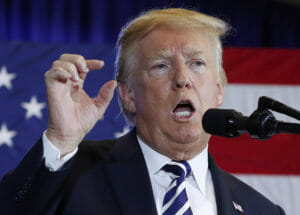Obamacare Lawsuit? It’s the Money, Stupid
To see the big picture behind the latest legal challenge to the Affordable Care Act, follow the money.To see the big picture behind the latest Supreme Court challenge to the Affordable Care Act, follow the money. Shutterstock
Shutterstock
“Follow the money.”
That was the advice given in the 1976 political docudrama “All the President’s Men” by the shadowy tipster known as Deep Throat to Washington Post reporter Bob Woodward, who along with Carl Bernstein had been assigned to investigate the 1972 burglary of the Democratic National Committee’s headquarters at the Watergate Hotel and office complex.
As the movie unfolds, Woodward and Bernstein don’t believe that the break-in was just a bungled “third-rate” burglary, as White House Press Secretary Ron Ziegler insisted at the time. They sense more sinister forces at work but can’t see the big picture. Following Deep Throat’s suggestion, they eventually connect the five men arrested for the break-in to campaign contributions illegally diverted to the Committee to Re-elect the President, and ultimately to President Richard M. Nixon himself.
Anyone hoping to understand the latest legal attack on Obamacare — King v. Burwell, set for oral argument before the Supreme Court on March 4 — would also do well to heed Deep Throat’s admonition and ask: Who is funding and promoting the case, and what do they really hope to achieve?
I’m not suggesting the King lawsuit is a criminal enterprise akin to the Watergate break-in and subsequent cover-up by the Nixon administration. But like Watergate, there is much more to the King case than initially meets the eye. Just as Watergate proved to be linked to Nixon’s grand designs for an imperial presidency, there’s something approaching a master plan at work in King, with bundles of money at stake.
On the surface, King is a rather straightforward statutory challenge to language contained in the Affordable Care Act about the availability of federal income tax subsidies to purchasers of health insurance and the way that language has been interpreted by the Internal Revenue Service. As Tom Goldstein, publisher of the influential Scotusblog.com website, has explained by way of background: “The ACA requires states to create ‘exchanges’ — essentially, marketplaces — for their residents to buy health insurance. But if a state refuses, the federal government will provide the exchange. The law then provides tax credits [or subsidies] for people who need financial assistance.”
Lawyers representing the four plaintiffs in the King case argue that under the terms of the act (specifically, section 1311), subsidies are available only to people enrolled “through an Exchange established by the State.” People who live in states that have refused to set up their own exchanges, like the four plaintiffs who live in Virginia, are forced to obtain coverage via the federal exchange coordinated by HeathCare.gov. According to their argument, they are not eligible for subsidies because of the restrictive wording of section 1311.
The plaintiffs contend they have been injured by this discrepancy — and thus that they have legal standing to sue — because the act mandates that they either buy medical insurance or pay a tax penalty. Their lawyers want the Supreme Court to declare that subsidies are restricted to state-exchange purchasers and that as a result, they and others like them who live in states without their own exchanges cannot be mandated to buy insurance at all. In other words, they want to kill the individual mandate by killing the subsidies that sustain the mandate.
Because 36 states have refused to set up their own exchanges, the ACA’s individual mandate indeed would be crippled if the King plaintiffs prevail in the Supreme Court. An estimated 7.3 million Americans would lose their federal tax subsidies if the plaintiffs win, rendering their health insurance unaffordable.
And the damage would not stop there. The ACA’s employer mandate — the requirement that businesses with more than 50 workers provide minimally acceptable health plans or pay substantial tax penalties, which is being phased in this year and next — would also be gutted by a plaintiffs’ victory.
This is because the employer mandate and its accompanying penalties apply only to businesses with employees who would be eligible to receive tax subsidies when buying insurance through an ACA exchange. Thus, if you invalidate employee eligibility for subsidies in 36 states — voilà! — you also invalidate the employer mandate in those states. The much-ballyhooed Obamacare “death spiral” would then ensue with a ripple effect as the system slowly collapsed nationwide.
Last July, however, the 4th Circuit Court of Appeals rejected the plaintiffs’ suit. In a unanimous ruling, the court upheld the IRS’ interpretation of the ACA — namely, that when construed as a whole and examined in light of its intention to make health insurance affordable to the greatest number of Americans, the act should be read to provide subsidies to all financially needy people who buy insurance, whether on the federal or a state exchange.
Although the 4th Circuit found that the King plaintiffs had legal standing to bring the lawsuit, articles recently published by The Wall Street Journal and Mother Jones magazine, have called into question their bona fides as persons injured by the act’s individual mandate. According to the articles, each of the plaintiffs — including lead litigant David King, a 64-year-old Vietnam veteran — would either be eligible for free medical insurance under an existing program (in King’s situation, by way of the Veterans Administration) — or would receive a hardship exemption from the individual mandate and any tax penalties under the ACA because their health insurance premiums would exceed 8 percent of their incomes.
One of King plaintiffs, Brenda Levy, a 64-year-old substitute teacher, even told Mother Jones that “she didn’t recall exactly how she had been selected as a plaintiff in the case … and that she had never met the lawyers handling the case in person. …” However, all of the plaintiffs appear to hold virulently harsh views of Barack Obama, led by Rose Luck, at 56 the youngest of the quartet, whose Facebook page, Mother Jones reports, refers to the president as the Antichrist.
Their collective anti-Obama animus aside, it’s clear that the plaintiffs themselves aren’t driving the lawsuit that bears their names. So who is it, to return to the Watergate analogy and Deep Throat, actually sitting behind the wheel? Where does their funding come from, and how do they have the clout to convince the Supreme Court to hear a case as deeply flawed in litigation and policy terms as the Watergate burglary was bungled in terms of being a criminal act?The blueprint for the King case — along with three other similar lawsuits filed across the country — reportedly was hatched at a conference sponsored by the American Enterprise Institute in December 2010. The idea of focusing on the subsidy language of the ACA’s section 1311 was then refined and publicized in a series of lectures, Op-Eds and position papers delivered and written by right-wing libertarian scholars and activists associated with the Cato Institute.
Ultimately, once a game plan was defined, funding for the case was provided by the Washington, D.C.-based Competitive Enterprise Institute.
CEI in turn recruited conservative über-lawyer Michael Carvin, a partner at the powerful Jones Day law firm, to serve as lead counsel. Among his many credits, Carvin represented candidate George W. Bush before the Florida Supreme Court in the 2000 presidential election recount controversy.
Although the CEI has received far less attention from the mainstream press than other libertarian outfits such as the Cato Institute and the Federalist Society, it is in some ways more vital to achieving the overall libertarian agenda of dismantling the modern regulatory welfare state.
The CEI was founded in 1984. Its website describes the organization as “Unique among free market groups” in that it “pursues a full-service approach to advancing public policy” through the publication of scholarly studies, deployment of media strategies, the building of political coalitions and by means of strategic litigation.
The CEI’s policy interests don’t stop with health care but extend to business, banking and finance, telecommunications, food and drug regulation, and — especially — energy and the environment. Media Matters lists the CEI as one of the prime purveyors of public disinformation about climate change, sponsoring paid advertisements, Op-Eds and blogs that misrepresent scientific research on the subject.
So, where does the CEI get the money to fund its mischief and zealotry? The most recent tax documents available on its website disclose that in 2012 the group raised $6,470,211 in contributions and grants.
Unfortunately, the CEI is organized as a tax-exempt educational institution under section 501(c)(3) of the Internal Revenue Code. As such, it is not required to disclose the identity of its donors.
Even so, those who have investigated the group, including the Union of Concerned Scientists, have discovered that the CEI’s biggest backers include the American Petroleum Institute ($25,000; 2009), Donor’s Capital Fund (607,280; 2007-2011), Donor’s Trust ($581,000; 2002-2011), ExxonMobil ($1.69 million; 2001-2005), General Motors Foundation ($245,000; 2003-2008), Charles G. Koch Charitable Foundation ($24,100; 2009) and Charles Koch’s Claude R. Lambe Charitable Foundation ($222,620; 2002-2011).
The list undoubtedly is incomplete and notably excludes the insurance industry, which benefits most from Obamacare. Still, the list strongly suggests that the latest legal challenge to Obamacare is but a single component of a larger corporate crusade to remake American law and government, dedicated to promoting business interests and prerogatives under the guise of individual liberty.
As Deep Throat advised, to see the big picture, you need to follow the money.
Your support matters…Independent journalism is under threat and overshadowed by heavily funded mainstream media.
You can help level the playing field. Become a member.
Your tax-deductible contribution keeps us digging beneath the headlines to give you thought-provoking, investigative reporting and analysis that unearths what's really happening- without compromise.
Give today to support our courageous, independent journalists.





You need to be a supporter to comment.
There are currently no responses to this article.
Be the first to respond.